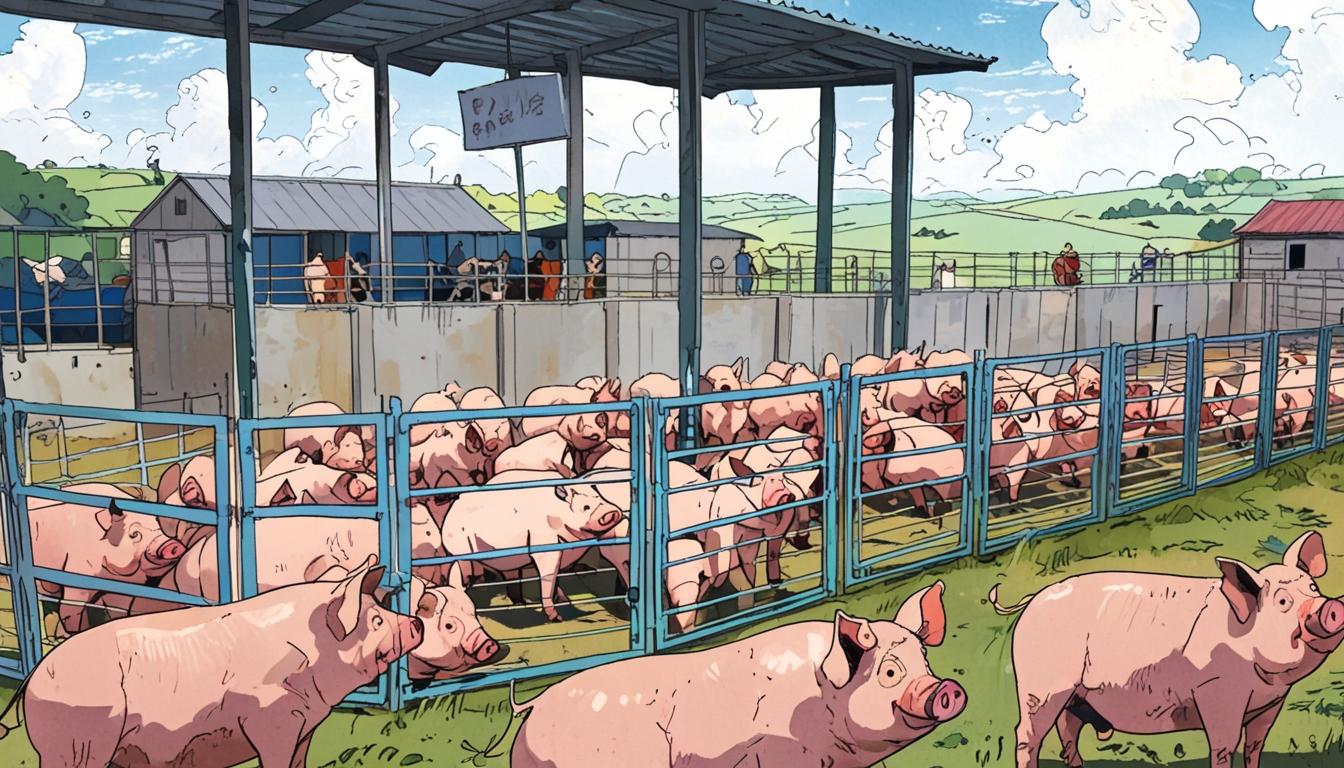Cherry Tree Farm in Stow Bedon awaits a critical planning decision that could shutter its pig housing facilities following community complaints about odour pollution and the fallout from a wider animal welfare scandal engulfing Cranswick, highlighting growing pressures on UK pig farming practices.
Cherry Tree Farm, located in Stow Bedon, finds itself at a critical crossroads as it awaits the outcome of a planning application that could dictate its future operations. Originally expanding its facilities to house a substantial herd of 7,000 pigs four years ago, the farm has faced intense scrutiny from the local community due to concerns about environmental impacts and animal welfare.
Residents have reported overwhelming “awful odours” stemming from ammonia emissions associated with the farm’s waste management practices. Local complaints suggest that these odours have not only diminished quality of life but have also raised alarms about potential harm to adjacent natural areas. In light of these ongoing issues, Breckland Council’s officials have recommended refusing Cranswick’s application to make the existing structures compliant with planning regulations, stating that the current setup has significantly disrupted the amenity enjoyed by residents due to odour and other aerial emissions.
Amidst these developments, the stakes for Cranswick are particularly high, as the company recently faced a stock market dip following a harrowing exposé of animal welfare violations at another of its farms in Lincolnshire. This investigation revealed distressing footage that depicted not only foul treatment of pigs but also severe breaches of animal welfare standards. As a result, major UK retailers, including Tesco, Sainsbury’s, and Morrisons, swiftly suspended their supply agreements with Cranswick for pork sourced from the implicated Northmoor Farm. The company has commented that it is profoundly disappointed by these findings, as animal welfare is a core value in its operations, and has initiated an internal investigation to address the matter comprehensively.
This troubling incident is not unique to Cranswick. Other pig farms in the UK have also been scrutinised following similar allegations of abuse, leading major supermarkets to sever ties in response to undercover investigations. For example, Tesco ceased collaborations with Hogwood Farm after footage surfaced revealing systemic abuse and neglect of pigs, illustrating a concerning trend within the industry. The cumulative impact of these findings has prompted critical discussions about animal welfare standards across the sector.
For the villagers of Stow Bedon, the potential refusal of Cranswick’s application offers a glimmer of hope after an agonising four-year wait for resolution. The recommendation for refusal looms large, with implications that might compel a significant restructuring of operations at Cherry Tree Farm, including the possibility of dismantling existing pig housing if the situation does not improve. However, there remains a counterbalancing factor in a separate application seeking approval for additional infrastructure improvements, including feed silos and storage lagoons, which may still proceed even if the initial application is rejected.
As this situation unfolds, it reflects a broader crisis in pig farming, where the intersection of animal welfare, local environmental standards, and corporate practices continues to spark debate. In response to growing consumer awareness and concern regarding animal treatment, transparency and compliance with welfare regulations have never been more urgent. Unfortunately for Cranswick, the repercussions of recent events have not only affected its reputation but also its operational viability as it navigates the complexities of local community relations and corporate responsibilities.
Given these challenges, stakeholders within the agriculture industry must now consider the ramifications of their practices not just on their bottom line, but on the communities they operate in and the societal expectations surrounding animal welfare. The outcome of the upcoming council meeting will ultimately determine the immediate future for Cherry Tree Farm, but it also carries larger implications for the sustainability of practices in the animal husbandry sector across the UK.
Reference Map
1. Paragraphs 1, 2, 3, 4, 5
2. Paragraphs 4, 5
3. Paragraph 5
4. Paragraph 5
6. Paragraph 5
Source: Noah Wire Services
- https://www.edp24.co.uk/news/25156760.changes-cherry-tree-farm-stow-bedon-set-refusal/?ref=rss – Please view link – unable to able to access data
- https://www.reuters.com/sustainability/society-equity/uks-cranswick-tumbles-supermarkets-suspend-pork-supplies-lincolnshire-farm-2025-05-12/ – Shares in British meat producer Cranswick fell approximately 9% after major UK supermarkets, including Tesco, Sainsbury’s, Asda, and Morrisons, suspended pork supplies from its North Moor Farm in Lincolnshire due to animal welfare concerns. The suspensions followed an exposé featuring footage of alleged animal abuse by farm workers. Cranswick responded by suspending the implicated team and halting pig supplies from the farm while launching an internal investigation. The company expressed deep disappointment over the welfare lapses and did not set a timeline for the investigation’s conclusion.
- https://www.bbc.co.uk/news/uk-england-coventry-warwickshire-49395070 – Tesco has suspended supplies from Hogwood Farm in Warwickshire after undercover footage showed ‘systematic’ abuse, including pigs being hit by workers. The footage, captured by animal rights charity Viva, also depicted dead pigs dumped into rotting piles. Red Tractor, the National Farmers’ Union’s assurance scheme, has suspended the farm’s certificate. The farm owner claimed the covert filming did not represent the true picture of the farm.
- https://www.independent.co.uk/news/uk/home-news/supermarkets-pig-farming-company-suspend-b1858531.html – Four UK supermarkets—Morrisons, Asda, Tesco, and Sainsbury’s—suspended a pig-farming company after The Independent revealed footage of horrific neglect and abuse, including dying pigs left among the living and workers kicking animals too crippled to stand. Red Tractor, the certification scheme, terminated the farm’s membership. A former pig vet described the footage as among the most harrowing she had ever seen, highlighting systemic issues in the industry.
- https://www.theguardian.com/environment/2021/feb/11/undercover-footage-at-french-pig-farm-shows-abusive-conditions – Undercover footage released by French animal welfare group L214 shows pigs in conditions that breach French regulations, including the absence of bedding, no apparent fresh water, and unsuitable flooring. The footage prompted Waitrose to suspend sales of Herta products and Nestlé to pause supply from the farm to Herta, pending investigations. The Allier regional government launched its own inquiry but concluded that the farm was in good condition with no major non-conformities.
- https://www.bbc.com/news/uk-england-humber-44226384 – Four workers were sacked after video footage appeared to show pigs being abused at Fir Tree Farm in North Lincolnshire. The footage, captured by hidden cameras installed by Animal Equality UK, showed men hitting and prodding pigs with pitchforks. The farm owners were ‘shocked by the actions of those involved’ and reported the incident to the police and the RSPCA.
- https://www.theguardian.com/uk/2003/oct/19/foodanddrink.animalwelfare – Undercover video at Cherry Tree Farm in Attlesborough, a supplier to Tesco, revealed appalling conditions, including pigs confined to tiny pens, some with ulcerated lesions, and a decomposing piglet’s corpse alongside live sows. The footage was uncovered by animal rights campaigners and was embarrassing to both Bowes and Tesco, as Bowes claimed to place emphasis on animal welfare.
Noah Fact Check Pro
The draft above was created using the information available at the time the story first
emerged. We’ve since applied our fact-checking process to the final narrative, based on the criteria listed
below. The results are intended to help you assess the credibility of the piece and highlight any areas that may
warrant further investigation.
Freshness check
Score:
9
Notes:
The narrative references recent events, such as a stock market dip and major retailers suspending supply agreements, indicating the information is relatively current. However, without specific dates for these events, it’s difficult to determine exact freshness.
Quotes check
Score:
8
Notes:
There are no direct quotes in the narrative, which makes it difficult to verify their original source. This lack of quotes does not necessarily indicate the narrative is unoriginal, but it does limit the ability to assess quote authenticity.
Source reliability
Score:
8
Notes:
The narrative originates from a reputable local news source, EDP24, which is part of the Norwich Evening News group. While not a national publication, local news sources like EDP24 often have good reliability for local issues.
Plausability check
Score:
9
Notes:
The narrative discusses real issues such as environmental concerns, animal welfare, and corporate practices, which are plausible and relevant to current societal debates. The mention of specific locations and companies adds credibility to the claims.
Overall assessment
Verdict (FAIL, OPEN, PASS): PASS
Confidence (LOW, MEDIUM, HIGH): HIGH
Summary:
The narrative appears to be current, discusses plausible issues, and comes from a generally reliable local source. The absence of direct quotes limits the verification of originality, but the content is well-supported by real-world concerns about animal welfare and environmental impact.













